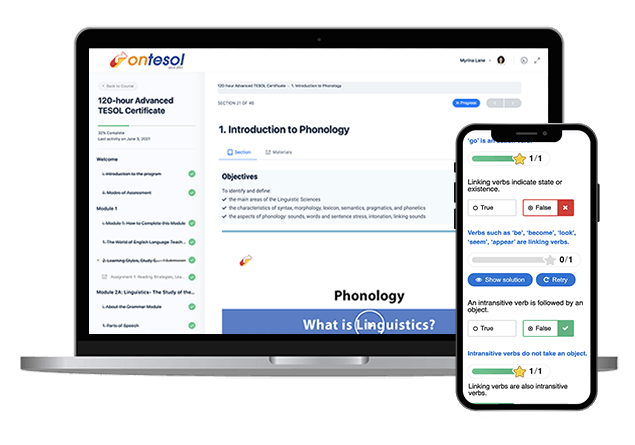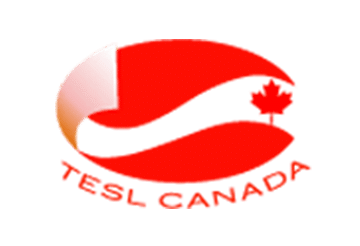Overview: 120-hour Advanced TESOL/TEFL Certificate
Get Certified to Teach English Worldwide!
Recognized Internationally
Institutionally accredited in the USA.
Course accredited at same level as major Canadian universities
Use your OnTESOL certificate to teach English abroad, teach English online, and teach English in Canada or the USA.
This course leads to TESL Canada certification, so you never have to take another 120-hour TESOL / TEFL / TESL / CELTA course again to progress in your career.
Earn 12 CEUs to maintain your teaching license and meet employment requirements in the USA.
Learning Outcomes
Academically equivalent to the UK-based CELTA and Trinity CertTESOL courses.
At OnTESOL, we prioritize advanced lesson planning skills, equipping you with the tools to design grammar, vocabulary, receptive skills, and productive skills lessons for any level.
Our comprehensive training encompasses grammar, phonology, and methodology, providing a solid theoretical foundation. But it’s our practical approach that truly sets us apart. Our 120-hour course includes three (3) hands-on lesson planning Lab Assignments – a unique feature that goes beyond the usual reflection essays and multiple choice tests found in other online TESOL/TEFL courses.
Practical Skills for Your Classroom
Learn professional skills to teach English worldwide so you will not need to complete another 120-hour TESOL/TEFL/TESL/CELTA to change countries or jobs.
Learn the teaching methods and lesson planning frameworks that you need to teach fun and effective English lessons to different levels of students, anywhere in the world. By the end of this online TESOL/TEFL course, you will be equipped with the skills to plan communicative and task-based lessons, adapt to any ESL curriculum in the world, and supplement the traditional ESL textbook with more engaging authentic material such as newspaper articles, movies, and songs.
Online TESOL/TEFL with Live Classes via Zoom
Live Instructor Led Training Included with your 120-hour Advanced TESOL/TEFL Certificate
Combine the flexibility of a self paced online TESOL/TEFL course with live, interactive workshops that build the practical lesson planning skills schools expect from professional ESL teachers.
OnTESOL is the first accredited online TESOL/TEFL provider to offer live classes via Zoom as part of a self paced certification program. Your 120 hour Advanced TESOL/TEFL Certificate includes 12 hours of live training with Senior Teacher Trainers: 1-hour Grammar Tutorial, 1-hour Phonology Tutorial, 10-hour Lesson Planning Workshop Series.
These live sessions strengthen everything you learn in the self paced modules. Learn alongside peers, ask questions in real time, and join group activities that directly support your Lesson Planning Lab Assignments.
Attendance is optional, but every session is designed to help you improve your performance in the course and build confidence in the classroom. All live classes are taught by Senior Trainers with extensive ESL teaching and teacher training experience.

Key Dates
Study TEFL online at your own pace and attend the 12-hour Live TEFL / TESOL Module when you reach the respective sections in the course.
| Event | Date & Time |
|---|---|
| Workshop 1 |
First Tuesday of the month, 6 pm – 8:30 pm (GMT-5, Toronto time) Access after passing Assignment 2 in Methodology |
| Workshops 2, 3, 4 |
Every subsequent Tuesday, 6 pm – 8:30 pm (GMT-5, Toronto time) Starts with Workshop 1 on the first Tuesday and ends with Workshop 4 on the fourth Tuesday of the month |
| 1-hr Grammar Tutorial |
Every second Thursday of the month, 6 pm – 7 pm (GMT-5) Access after passing Module 1 |
| 1-hr Phonology Tutorial |
Every fourth Thursday of the month, 6 pm – 7 pm (GMT-5) Access after passing the grammar test |
Workshop Schedule: The workshops are held in four sessions, each lasting 2.5 hours. They begin with Workshop 1 on the first Tuesday of the month and conclude with Workshop 4 on the fourth Tuesday.
Flexible Attendance: Live classes run every month, so you can attend them when you reach each section of your course. Join all sessions in a single month or spread them throughout your study time.
SYLLABUS
COURSE STRUCTURE
COURSE DURATION :
This online TESOL/TEFL course is asynchronous and takes anywhere between 1 and 6 months to complete.
You can enroll any time and study at your pace for a maximum of 6 months. You will pass the course after completing all the required tests and assignments.
Depending on your pace and performance, you can expect to complete this course in 1 to 6 months. For your reference, a similar professional-level TESOL/TEFL/TESL/CELTA course offered in-class on a full-time, 7-hour daily schedule takes 4 weeks to complete it. If you work full-time or have other academic commitments, you will have up to 6 months to pass the online course with OnTESOL.
SYLLABUS & MODE OF ASSESSMENT:
There are a total of 5 assignments, 6 quizzes, discussion forums, and two exams required to pass the 120-hour Advanced TESOL Certificate course, including 3 lesson planning labs. A personal tutor will be assigned to correct your lesson plan assignments, provide you with feedback, and answer your questions.
Module 1: Study Skills, Learning Preferences and the Adult Learner
This module contains general information on the ESL/EFL/ELT industry and explains the characteristics of the adult learner (Andragogy), types of learning styles, and study skills techniques to help students maximize the learning process.
Module 2A: Grammar
In this module, we will cover the basics of English grammar. This material is designed to be accessible for so-called ‘pre-service’ trainees (that is, trainees who have never taught before), and for new teachers. For those with teaching experience, it will be a good refresher course.
• Chapter 1: Parts of Speech
• Chapter 2: Parts of a Sentence
• Chapter 3: Nouns
• Chapter 4: Pronouns
• Chapter 5: Adjectives- Determiners and Articles
• Chapter 6: Adverbs
• Chapter 7: Verbs
• Chapter 8: Conjunctions
• Chapter 9: Prepositions
• Chapter 10: Tenses
• Chapter 11: Ideas for Teaching grammar
A final test must be submitted at the end of this section.
1-hour Grammar Tutorial: You will have access after passing Module 1. Every second Thursday of the month. 6pm-7pm (GMT-5 Toronto time)
Module 2B: Phonology
In this module, we will cover the main features of pronunciation: Introduction to Phonology, Introduction to Phonemes, Getting to Know the Anatomy of the Mouth, Vowels, Diphthongs and Triphthongs, Consonants, Sentence Stress, Intonation.
• Chapter 1: Introduction to Phonology
• Chapter 2: Introduction to Phonemes
• Chapter 3: Getting to Know the Anatomy of the Mouth
• Chapter 4: Vowels, diphthongs and triphthongs
• Chapter 5: Consonants
• Chapter 6: Sentence Stress
• Chapter 7: Intonation
• Chapter 8: Teaching pronunciation
A final test must be submitted at the end of this section.
1-hour Phonology Tutorial: You will have access after passing the grammar test. Every fourth Thursday of the month. 6pm-7pm (GMT-5 Toronto time)
Module 3: Methodology
Methodology is the most important module in the 120-hour Advanced TESOL/TEFL Certificate course. You will have to complete five (5) assignments, which will require you to develop activities, create full lesson plans, and write an observation report on recorded ESL lessons. The three (3) Lab Assignments in this 120-hour TESOL/TEFL course will teach you to use the most popular ESL lesson planning frameworks to prepare you to teach English to different levels.
10-hour Live Lesson Planning Workshop
Across four 2.5 hour sessions, our senior trainers review the most important parts of the methodology module and show how to apply them to real lesson planning scenarios. You can ask questions in real time and join practical group activities designed to strengthen your skills before you begin the Lab Assignments.
Attendance is optional. You can complete the full course and all Lab Assignments without joining the live sessions, but many students find these workshops extremely helpful for building confidence before beginning the major lesson planning tasks.
What the workshop series covers
Workshop #1: PPP for Grammar Lessons
Workshop #2: Designing Integrated Vocabulary Lessons
Workshop#3: Planning for Receptive Skills with PPP and ESA
Workshop#4: Authenticity in the Classroom and Task-based Learning
Schedule and access
You’ll gain access to the workshop series after passing Assignment 2 in the methodology module.
Live sessions take place every Tuesday from 6pm to 8:30pm, GMT 5 Eastern Time.
A new four workshop cycle begins on the first Tuesday of each month and runs through the fourth Tuesday.
Attendance is optional
The workshops are there to support your success, not to determine your progress. You’re free to complete your certification with or without joining the live classes.
Attendance is optional
View Chapters
Chapter 1: The First Class
The purpose of this chapter is to consider the importance of establishing initial connections in the classroom because these connections set the tone for the entire learning experience. You will be required to make personal reflections in order to more effectively empathize with your students’ situations. The chapter then sets out suggestions for icebreakers in the classroom. Finally, you will analyze features of these introduction techniques from a teacher’s point of view.
Chapter 2: Approaches to Language Teaching
This chapter contains a very condensed and subjective synopsis of the main currents in the history of language teaching methodology (Grammar Translation Method, Direct Method, and Audiolingualism).
Chapter 3: The Communicative Approach
In chapter 2 we discuss some of the major approaches to second language teaching and learning. These are grammatically oriented approaches (They focus on accuracy rather than meaning and fluency). In this chapter we focus on the Communicative Approach, which is semantically oriented (The Communicative Approach is based on the idea that learning a language successfully comes through having to communicate real meaning).
Chapter 4: The Speaking Skill
In this chapter you will learn how to effectively teach speaking skills. Learners generally want to master speaking skills as soon as possible. However, together with listening, it is probably the most difficult skill to develop. Speaking requires that learners not only know how to produce specific points of language such as grammar, pronunciation, or vocabulary (linguistic competence), but also that they understand when, why, and in what ways to produce language (sociolinguistic competence).
Chapter 5: Teaching Grammar Communicatively
There are different ways to present or review a grammar topic. You need to be eclectic and decide what the best method for your students is, taking into account their level, age and interests, and the syllabus and textbook you are using. In this chapter you will learn some of the most common frameworks used in a Communicative Approach lesson.
Chapter 6: How to Write a PPP Lesson Plan
Organizing your ideas, knowing the steps to follow in a lesson, and having a clear objective of what you want your students to learn in the lesson are elements that will make your class successful. In this chapter you will be introduced to the techniques that are required to write a professional lesson plan, so that you can apply these techniques to teaching the four skills that students need to develop in order to communicate in the target language: speaking and writing (productive skills); and listening and reading (receptive skills).
Chapter 7: More Lesson Planning Frameworks
This chapter shows how other lesson planning frameworks (ESA, TTT, and TBL) can be used for different class objectives.
Chapter 8: Teaching Vocabulary
In this chapter you will learn the fundamental skills for teaching vocabulary lessons.
Chapter 9: The Listening Skill
Many teachers think that a listening activity is just playing a tape, asking comprehension questions or using true and false activities. “The lesson is over! My students have done listening!” No learning process was involved in such a listening lesson. In this chapter you will learn how to effectively teach listening skills.
Chapter 10: The Reading Skill
In this chapter you will look at reading comprehension techniques and lesson plans for reading activities to learn how to effectively teach reading skills.
Chapter 11: The Writing Skill
The macroskill of writing is the one most often ignored by teachers. To exacerbate this, students very often do not seem interested in practicing this skill. One of the major reasons that writing is given short shrift in the classroom is that teachers do not know how to present and exploit this skill in a communicative and interesting way. In this chapter you will learn how to effectively teach writing skills.
Chapter 12: Using Authentic Material
Authentic material complements English classes by enlivening the class, giving the chance to add variety in your lessons and creating a more positive attitude toward learning. It can be used to develop the four macro-skills: reading, listening, speaking and writing. In this chapter you will learn how to use authentic materials effectively for all levels.
Chapter 13: Correcting Learners’ Language mistakes
There is no doubt that anyone who is learning a new language will make mistakes, either spoken or written. In this chapter, you will learn techniques and strategies to correct spoken and written mistakes.
Chapter 14: Classroom Management
This chapter covers classroom management in terms of the role of the teacher, the student’s behaviour, the activities, grouping students, seating arrangements, discipline problems and possible solutions.
Chapter 15: Testing and Assessment in the ESL Classroom
In this chapter, you will study the purpose of evaluation, testing and assessment, including types of tests and approaches for direct and indirect testing.
Chapter 16: Video Observation Chapter:
In this section, you will observe a lesson taught at an upper-intermediate level. You will have to write a report analyzing the different aspects of the lesson.
What’s Included in the Tuition Fee?

All Course Material
All course material is included in the tuition fee. You can access our responsive student portal from your desktop, phone, or table and you also have the option to download each chapter in PDF for printing and/or offline viewing.
120-Hour Advanced TESOL/TEFL Certificate and Transcript
Graduates will receive a 120-hour Advanced TESOL/TEFL certificate and transcript issued by Coventry House International – OnTESOL.
All certificates and transcripts are sent by mail from our office in Toronto. Graduates may also download a digital copy from the student portal.
The certificate is signed by our Director of Studies, stamped, and includes a unique verification number for employers.
Professional Tutor Support
An experienced teacher trainer will be assigned to assist you throughout the program. Your tutor will provide you with extensive feedback on every assignment to help you improve your teaching methods.
OnTESOL only hires teacher trainers with more than 10 years of experience in the ESL classroom and more than 5 years of experience in CELTA, Trinity CertTESOL, or TESL Canada approved courses.
All our tutors are recognized by TESL Canada, so you are guaranteed to receive professional tutor support from a qualified and experienced teacher trainer.
Job Placement Assistance

Tuition Fee:  CA$650
CA$650
Tuition Fee:  US$460
US$460
Course Reviews: 120-hour Advanced TESOL /TEFL Certificate
WHAT OUR GRADUATES SAY
“I found the 120-hour TESOL certificate program challenging and rewarding. This course allowed me to gain a proper understanding of the concepts and methods that work in the ESL classroom. This TESOL course helped me to better organize my classes and ultimately benefit my students”.
Erik Sorenson
Teaching in South Korea
My 120-hours OnTESOL course was an effective, efficient, and high-quality expenditure of my time and money. My instructor was easy to communicate with, responsive, and provided in-depth feedback that was entirely specific to my work. I appreciated the time and effort that she put into providing me with feedback. Since completing this certificate, I have had steady work as an ESL instructor at various post-secondary institutions in Canada. I have recommended OnTESOL’s program to my friends and will continue to recommend it to anyone who is interested in TESL certification.
S. Cowley
Teaching in Canada
The lesson planning assignments and reflection essays challenged me to think about what I would actually do if I were in a classroom, making the learning experience all that more experiential. The online course prepared me really well for the Practicum and my tutor provided me with invaluable support as he shared his own personal perspective on teaching and how he structures his lessons.
Clare Esler
Teaching in Canada
Frequently Asked Questions
An Advanced TESOL/TEFL Certificate is a professional-level qualification for teaching English as a second or foreign language. It provides comprehensive training in grammar, phonology, and methodology, with hands-on lesson planning assignments that integrate grammar and language skills like speaking, writing, reading, and listening.
Unlike basic TESOL/TEFL courses, advanced programs offer in-depth content, rigorous assessments, and accreditation by organizations like TESL Canada, Trinity CertTESOL, or CELTA. These qualifications prepare graduates to adapt to any curriculum and pursue a long-term career in education.
The 120-hour Advanced TESOL/TEFL Certificate course is designed for flexibility, allowing you to complete it at your own pace while balancing work or study commitments.
Minimum Completion Time: 4 weeks (for those who can dedicate more study time).
Maximum Completion Time: 6 months from your official Start Date.
Your Start Date is the day your course is activated, which happens once you successfully enroll. This date will be indicated in your Course Activation email. From that day, you’ll have up to 6 months to complete the course at your own pace.
No, a university degree is not required to enroll in this TESOL/TEFL course. We welcome applicants from diverse educational backgrounds, whether you are currently in college or university, or your highest qualification is a high school diploma.
However, it’s important to note:
Employment Requirements: Many employers require a university degree to teach English abroad, and in most countries, a degree is necessary to obtain a work permit.
TESL Canada Certification: If you plan to apply for a TESL Canada Professional Certificate, you must hold a university degree or its equivalent.
120-hour Advanced TESOL/TEFL Certificate
Register Today
Tuition Fee:  CA$650
CA$650
Tuition Fee:
 $460
$460
Add extra! 20-hour Teaching a Business Course (TBEC) Certificate
This 20-hour Teaching Business English Course will prepare you for one-to-one private tutoring, in-company lessons, and Business English programs at major international language schools. This program is fully online and it will teach you how to assess your learners’ needs, how to develop a syllabus based on lesson plans that meet the unique needs of each Business English student, and how to find appropriate material to cover the main aims of a Business English course.
Add extra! 20-hour Teaching English to Young Learners (TEYL) Certificate
The 20-hour TEYL Certificate course has been carefully developed to address the needs of young learners. This online TEYL certificate course is perfect for public school teachers, new ESL teachers, and TESOL/TEFL certified teachers who work with students between the age of 4 and 15. This specialist is very popular with those who are teaching English with EPIK in South Korea, NETS in Hong Kong, ADEC in the UAE, English First in China, the JET Programme in Japan, or k-12 programs in North America.
Why is the TEYL Specialist Important?
Teaching children and teenagers is a challenging job, so we designed this course to give you the tools and confidence that you need to stand in front of a class full of rowdy kids!
The 20-hour Teaching English to Young Learners specialist reviews the most effective approaches for teaching grammar and pronunciation, shows trainees how to analyze a TEYL textbook, and provides practical training on how to use the Task-based Learning approach via a major lesson plan assignment.
add extra! 20-hour Teaching English Online Certificate
This course will teach you the core elements of teaching a language online, including appropriate technologies and strategies to create your online program or prepare yourself for working for an online language school. You will learn how to evaluate and use online technologies, determine the type of teaching approach or strategies appropriate for your teaching target, and if you wish to be your own boss, learn the basics to design your online program.
add extra! 20-hour Teaching IELTS Certificate
Help your students approach the IELTS test with confidence to get the best possible results! In this course, you will find detailed information about the IELTS test and you will also explore strategies and techniques to teach all four papers (Reading, Listening, Writing and Speaking). You will have access to materials for online practice to help you prepare your IELTS lessons.









